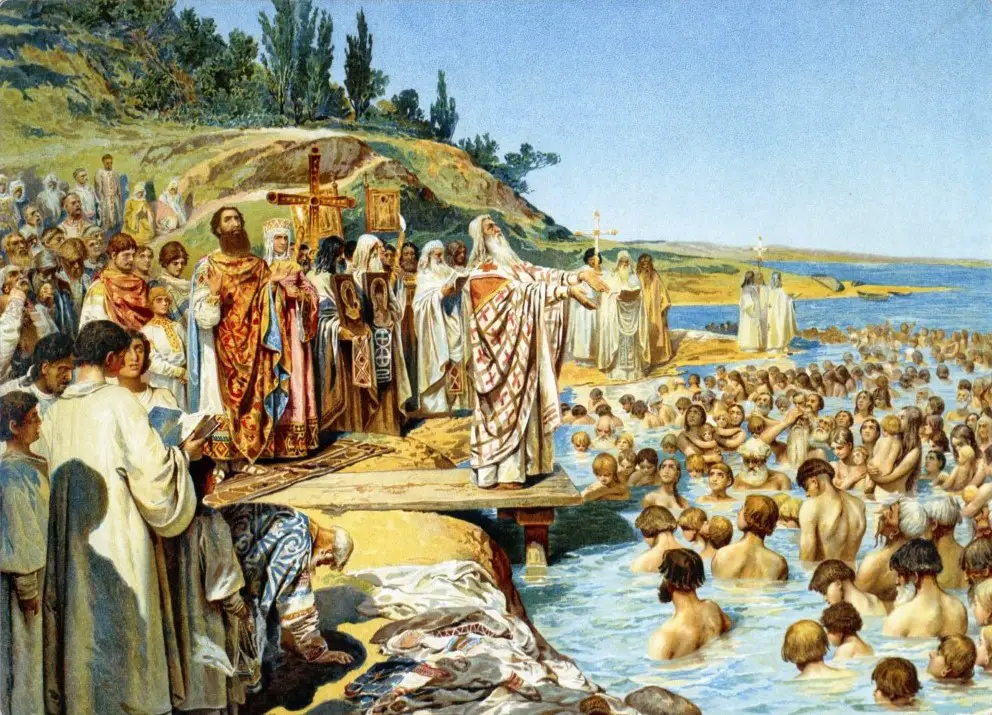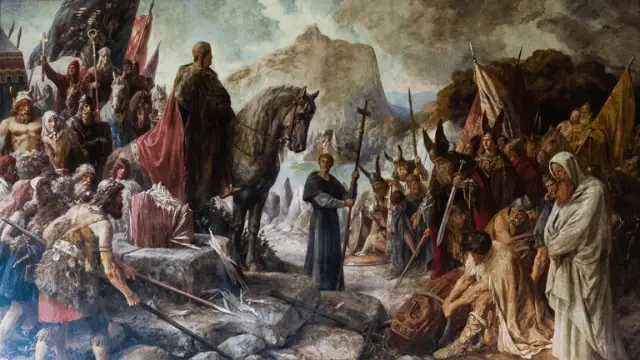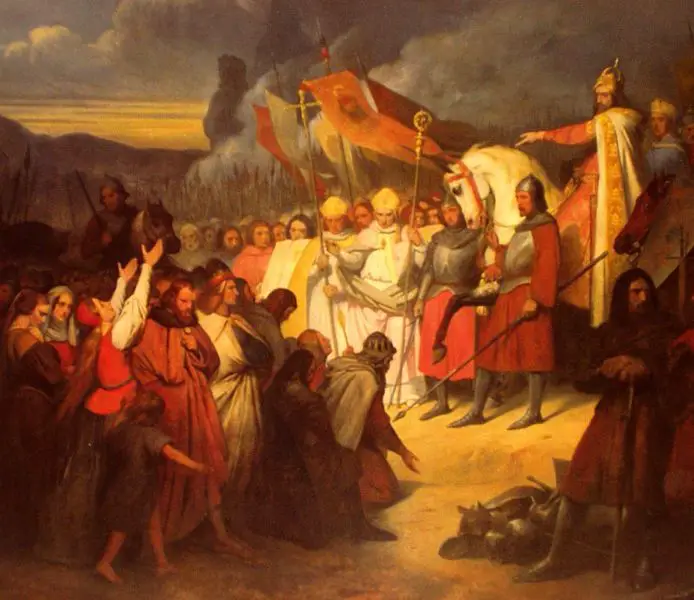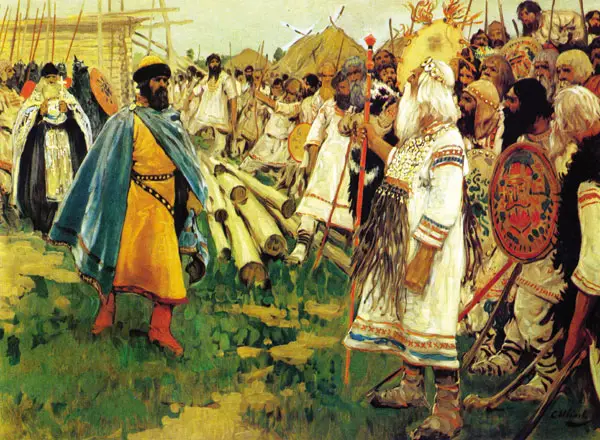Let's retrace the millennial relationship between monotheism and polytheism, from Roman to medieval Europe.
di Marco Pelagatti
cover: Julius Köckert, "Harun al Rascid receives envoys from Charlemange, 786", 1864
«The emperor (Nero) subjected the Christians to torture, a race of men of a new and evil superstition ». [1]
«Those whom their wickedness made hateful and whom the common people called Christians». [2]
In the period betweenEdict of Milan (313), which sanctioned freedom of worship for Christians, and theEdict of Thessalonica (380), which yielded de facto Christianity as an imperial religion, Christians and pagans coexisted in the same space, confronting and confronting each other. Here we can hardly recall, among other pagans, Plutarch, Plotinus, Proclus and Porphyry. However, under the pressure of the new cult, in a short time the ancient ones turn more and more to sunset, at least as regards the "official" history: the last pagan emperor was Giuliano, immolated on the battlefield against the Sassanids in 363 [3]. When he dies, Christian authors rejoice, like Gregory of Nazianzo who proclaims triumphantly:
«Listen, peoples! [...] the tyrant was extinguished [...] the dragon, the Apostate, the Great Intellect, the Assyrian, the common enemy and abomination of the universe, the fury that much haunted and threatened the earth, much against Heaven worked with the tongue and with the hand ". [4]

Vicisti, Galileo. "Galileo, you have won." Perhaps the emperor Julian never uttered these two words, even though Theodoret of Cirro says so [5], but it was already evident that times were changing in favor of Christianity. Shortly thereafter the Edict of Thessalonica will arrive and just a few years later, in 384, the duel on the altar of victory between Symmachus and Ambrose: the decisive moment, the epitome of the confrontation between Christians and pagans. Symmachus knows he is fighting a rearguard battle, and asks for tolerance and respect, with words that seem written in stone:
«It is fair to admit that what all men worship is one and the same being. We contemplate the same stars, the same sky dominates us, only one is the universe that surrounds us: what does it matter with what doctrine each of us seeks the truth? One cannot reach such a profound secret by one way only. " [6]
But Ambrose feels he is winning and admonishes the emperor, indeed "the most Christian emperor", to protect the only true faith, the only one worthy of protection. For Ambrose there are not various ways to reach the divine, all respectable, but only one, the true one. There is only one true God, all others are false and liars. It's only been two centuries since Tertullian asked for tolerance for persecuted Christians:
“It is impiety to take away from men their freedom in matters of religion, to prevent them from making the choice of a divinity; no man, no God would like to know of a forced service ». [7]
And then we come to the logical conclusion of San Cipriano: extra ecclesiam nulla salus, "Outside the church there is no salvation". Paganism falls, with the last Christian apologists raging. Arnobius dedicates five books out of seven ofAgainst nations in a violent and detailed controversy against pagan gods and cults, described for the sole purpose of demonstrating the limit of pagan thought on divinity, while Firmicus Maternal he contrasts the morality of the new religion with the immorality of paganism with a rhetorically heated, often sarcastic language [8].

Iuppiter fell before Christ, although the old religion, even if persecuted and ostracized, continues to survive in part in the Western countryside [9]. Carlo Cattaneo reports that at the end of the eighth century the cult of Saturn it still survived in the extreme Valcamonica [10]. Furthermore, the Catholic Church, with a series of operations bordering on the syncretism, is able to cleverly replace pagan cults by superimposing Christian cults on them: the celebration of Christmas will replace the imperial one of Dies Solis Invicti, in Britain the feast of Ostara it will be replaced by Easter, and so on [11].
To resist for several centuries will be the of the Norsemen, Wotan and Thor. The Germans that spread to the West with the Wandervolkerung in the fifth century, after an initial attachment to their gods, they converted to Catholicism, sometimes after an Aryan interlude. More resistant the Saxons (both in Germany and England) and the Vikings, but they too will eventually accept the "White Christ" [12]: just think of Vitichyndus, which surrenders at the same time as Charlemagne and to Christianity, oa Snorri sturluson,Icelandic writer ofEdda, our main source on Norse gods. The last pagan bulwark in Europe, the great Russia, led by its ruler Vladimir the Holy he will accept baptism in 988, in the Dnieper River. The Baltic peoples will eventually be converted by the Teutonic Knights. Christianity or Europe, as Novalis could write in 1799.
But what will be the fate of those who in their life have never heard of Jesus? Dante Alighieri places (at least) in Limbo the righteous who did not know Christ, like Virgilio, his guide, but others considered them damned tout court. Which, at least for the Germans and Norsemen, created a huge problem: their ancestors. Your predecessors, former princes of the Frisians, dying unbaptized, are undoubtedly damned, he says king Rathbod Bishop Wulfram [13]. And yet King Rathbod, who already had his feet in the water, replies to Bishop Wulfram that if his baptism does not save his ancestors, he prefers to stay with them; and therefore he refuses baptism: source regenerationis noluit mergi [14].

Therefore, or so it seems, the curtain falls on the confrontation between pagans and Christians. The latter will have their work cut out for many centuries: no longer against the pagans, but against the heretics and Infidels (Jews and Muslims), who will be gleefully confused with the pagans. According to Roland's song King Marsilius "Mohammed venerates and Apollo adores". It is useless to explain that the first Muslim dogma is precisely the affirmation of a rigid monotheism. Meanwhile, paganism is extinguished throughout Europe, surviving however as in a karst river in legends, fairy tales and tales, especially in the Celtic area, as Marco Maculotti recalls speaking of WB Yeats's Ireland:
"The families of peasants, ranchers and fishermen where Yeats lived and who contributed to the realization of these anthologies of traditional tales, despite being nominally Catholic or Protestant, still clearly maintained" pagan "beliefs at the beginning of the twentieth century". [15]
Meanwhile theExtra ecclesiam nulla salus, at first a solid monolith, it begins to crack; are we always sure that there is one and only one way to be saved? In 1353 the Boccaccio inserts into the Decameron the fable of the three rings, in which two "infidels", the Jewish Melchizedek and the Muslim Saladin, actually propose a more open and tolerant vision of man's relationship with God [16]. It will come later lessing to re-propose this theme with Nathan the Wise, and then the Enlightenment, especially with Voltaire and its anti-dogmatic deism, hostile to Catholicism and Judaism; but, we would like to say, hostile above all to the more backward aspects of revealed religions.
And today? A theologian like Vito Mancuso declares that the coming of Christ, the Incarnation, to be truly euangelon, "Good news", must save men more and better than before, and not exclude some. He believes inapocatastasis, universal forgiveness, and in this it can boast illustrious predecessors, from the ancients as Origen and at least in part Pelagius to moderns like Urs von Balthasar.
Is one religion worth the other? Please allow us to join Mircea eliade, for which even if Christianity can be the well to us closer to draw from God, he is certainly not the only one: so that we can hope for salvation for us, for the ancestors of Rathbod, for the ancestors our. Like Symmachus and Virgil and Cicero: pagans as much as you like, but Men. Our ancestors, our blood. That we want to believe safely, in face universal of God.

Note:
[1] Suetonius, Life of Nero.
[2] Tacit, Annals XV, 44, 2
[3] A great emperor. Who read The Roman Empire of Santo Mazzarino will have perceived the great admiration of the professor for Giuliano.
[4] Gregory of Nazianzo, Prayer IV, 1. In this regard, see The solar monotheism of the Emperor Flavius Claudius Julian by Daniele Perra here on Axis Mundi.
[5] In 'Ecclesiastical history, written almost a century after the facts.
[6] Symmachus, The altar of Victory, Sellerio publisher, 1991.
[7] Tertullian, Apologeticum.
[8] Cf: Firmico Materno, The error of pagan religions, Rome 2006. Introduction, translation and notes by E. Sanzi.
[9] Pagano derives etymologically from pagus, village.
[10] See: Carlo Cattaneo, Lombardy news, Garzanti, 1979, p. 49.
[11] In this regard, we would like to recommend the essay by Simone Salandra, The symbolism of the two solstices, here on Axis Mundi.
[12] This is what the Germans and Vikings called Jesus. See: Cynewulf, The dream of the cross.
[13] "Your ancestors ... by dying without baptism, they are certainly damned" "He did not want to be immersed in the baptismal font." Ibid. Robert Robinson, The history of baptism, Applewood Books, 2009, p. 118.
[14] "He did not want to be immersed in the baptismal font" Ibid.
[15] Marco Maculotti, WB Yeats, navigator of the Great Memory, remove.
[16] Third story, first day.
